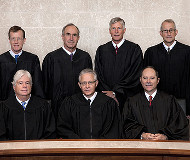Article from: www.thenewspaper.com/news/66/6638.asp
1/29/2019
Iowa Supreme Court Updates Pro-Speed Camera Ruling
Upon petition by Cedar Rapids, the Iowa Supreme Court decides to revise its ruling to favor speed cameras even more.
 The Iowa Supreme Court issued a series of decisions in September in favor of automated ticketing machines. The justices, however, failed to reach consensus on a number of key issues and the most significant opinion reflected the fractured nature of the court. The justices on Friday decided to resolve a few items that were left open in last year's decision after Cedar Rapids demanded the high court make the findings even more favorable to the city.
The Iowa Supreme Court issued a series of decisions in September in favor of automated ticketing machines. The justices, however, failed to reach consensus on a number of key issues and the most significant opinion reflected the fractured nature of the court. The justices on Friday decided to resolve a few items that were left open in last year's decision after Cedar Rapids demanded the high court make the findings even more favorable to the city.
"Upon review, we find that the city's petition for rehearing is well taken," Justice Brent R. Appel wrote in the newly revised decision.
Opponents of the speed cameras had argued the program violated state law by creating a city-controlled administrative board to declare motorists guilty when the municipal court should have had jurisdiction under the law.
"Nothing in the ordinance is inconsistent with the notion that the only way to enforce a violation of an ordinance on a person who refuses voluntary payment is to launch a municipal infraction proceeding," Justice Appel wrote. "We recognize that there are other plausible interpretations of the ordinance. But we do not find conflict preemption unless the conflict is obvious, unavoidable, and not a matter of reasonable debate."
Aside from tidying up the language of the ruling in places and excising a section referencing the deadlock of the justices on a number of issues, the rest of the case remains largely the same. The justices did retain a handful of sharp comments digging at the motives underlying the multi-million-dollar ticketing program. In particular, the justices noticed the speed cameras are placed in the location beyond a tricky portion of Interstate 235 where motorists are likely to speed up because the road straightens out.
"One might also wonder why the city maintains a system generating 35,000 tickets per year at the end of the hazardous 'S' curve when, according to the Iowa Department of Transportation, most of the danger has passed," Justice Appel wrote. "This suggests that the placement of the automated traffic enforcement equipment is concerned with the generation of money rather than safety."
A copy of the revised ruling is available in a 400k PDF file at the source link below.
Source: Behm v. Cedar Rapids (Iowa Supreme Court, 1/25/2019)
Permanent Link for this item
Return to Front Page
 The Iowa Supreme Court issued a series of decisions in September in favor of automated ticketing machines. The justices, however, failed to reach consensus on a number of key issues and the most significant opinion reflected the fractured nature of the court. The justices on Friday decided to resolve a few items that were left open in last year's decision after Cedar Rapids demanded the high court make the findings even more favorable to the city.
The Iowa Supreme Court issued a series of decisions in September in favor of automated ticketing machines. The justices, however, failed to reach consensus on a number of key issues and the most significant opinion reflected the fractured nature of the court. The justices on Friday decided to resolve a few items that were left open in last year's decision after Cedar Rapids demanded the high court make the findings even more favorable to the city.